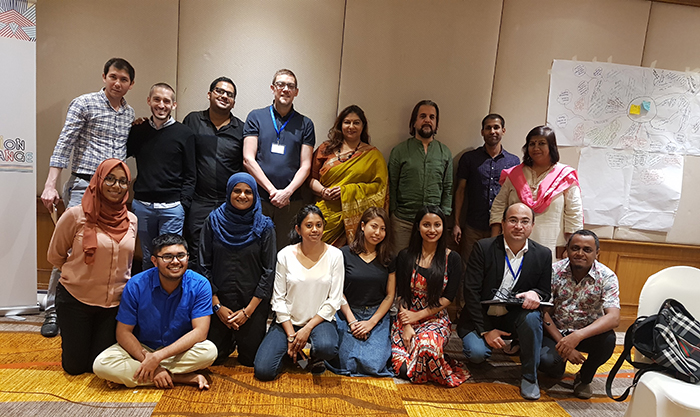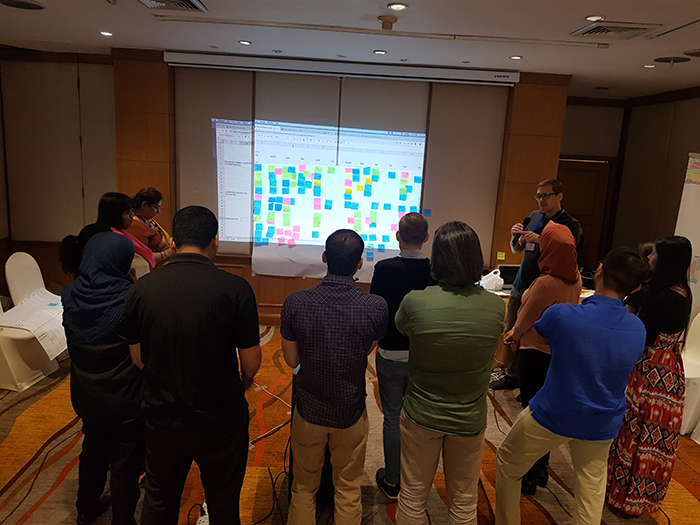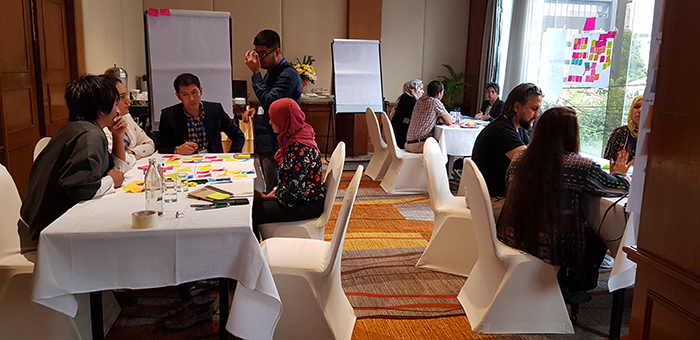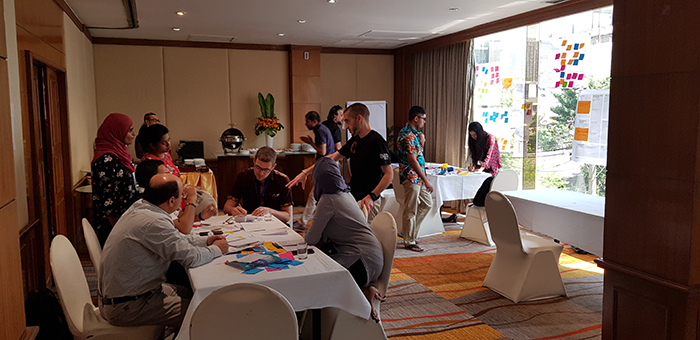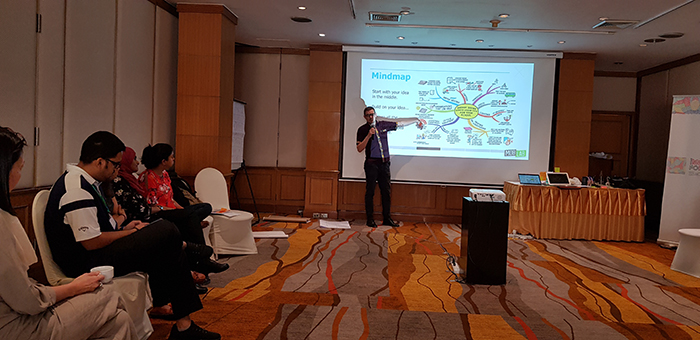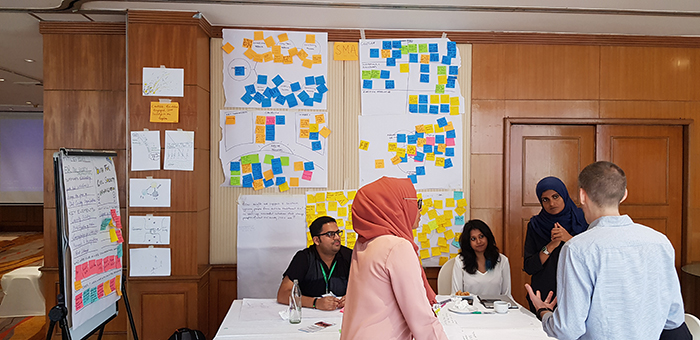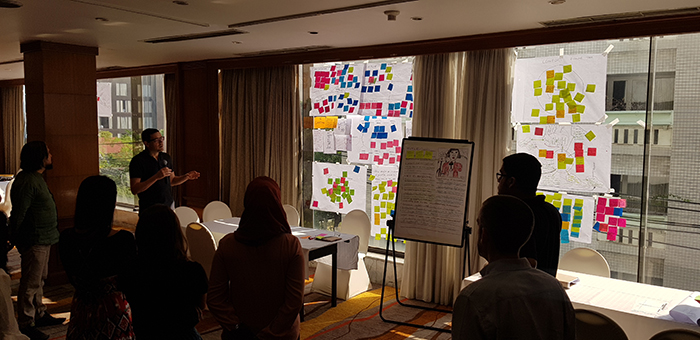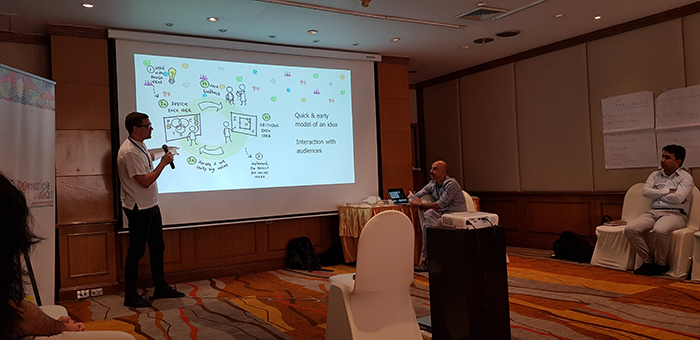Innovation for Change - South Asia Hub Annual Regional Co-Design & Campaign Planning Workshop
Published:
Updated:

Innovation for Change - South Asia Hub Annual Regional Co-Design & Campaign Planning Workshop
21-25 January 2019, Bangkok Thailand.
Innovation for Change- South Asia Hub hosted members from across the region to its Annual Co-Design process to collaboratively plan the Hub’s 2019 services.
Aims of both Co-Design and Campaign Planning
- Exploratory - to receive updates and expert analysis on the extent and nature on the latest civic space restrictions countries in South Asia are facing
- Campaign co-design - share campaigning strategies and tactics to support the strengthening of national campaigns and collaboratively design a South Asia regional campaign. Campaign designs will be shared with the Board and decided to be included in next year’s Work Plan
- Work Plan Activities - The designed services and campaign will be presented at the end of the week during Biannual Board Meeting where the Board will decide 2019 Work Plan activities
- Network - build an invested community of campaigners in the region
The workshop focused on challenges to civic space in South Asia in 2018
- The CIVICUS Monitor reports a worrying story in South Asia regarding civic freedoms. The data shows that from the eight countries in the region three are countries in the repressed category including Afghanistan, Pakistan and Bangladesh and five in the obstructed category. Worryingly, there are currently no countries in the open or narrowed rating. Elections in India, Bangladesh, Pakistan saw an escalation of civic space violations in these countries during 2018.
- Our research shows that attacks and criminalization of journalists and censorship are one of the top civic space violations in the region in 2018. In Nepal, journalists faced threats and attacks for exposing corruption or illegal practices or while covering demonstrations. In Bangladesh, media workers covering protests have been attacked, beaten, assaulted by activists affiliated with the youth wing of the ruling party with impunity. Renowned photojournalist Shahidul Alam, arrested in August 2018 spent 107 days in pre-trial detention for critical comments he made during mass student protests. He was subsequently charged under the draconian Information and Communications Technology Act (which has since been replaced by the Digital Security Act) for spreading false information.
- In Pakistan, the military escalated its censorship of the media ahead of the 2018 elections with a crackdown on media houses and journalists to censor or silence the press and control the public narrative. Geo TV was taken off the air and the circulation of Dawn, Pakistan’s most-respected English language daily newspaper, blocked for refusing to follow the military line. In the Maldives the previous government used the 2016 Anti-Defamation and Freedom of Expression Act to stifle the media. In August 2018, Maldivian media outlet RajjeTV was fined 130,000 USD under the law for live broadcasting a politician’s speech from an opposition demonstration. Afghanistan was one of the most dangerous countries in the world for journalists with nine killed in one incident in twin bombings in Kabul in April 2018 by the so-called Islamic State (also referred to as Da'esh).
- Data on the Monitor also show arbitrary arrests and the excessive use of force or firearms using against protesters by security forces is a recurrent issue across the South Asian region. In Thoothukudi, India in May 2018, police fired live ammunition into a crowd protesting against pollution, killing at least 10 people. In Bangladesh, hundreds of protesters involved in the ‘quota reform’ and ‘road safety’ protests that occurred in 2018 were arbitrarily arrested and some were allegedly subjected to torture in detention. Many protesters especially students were allegedly attacked by the student wing of the ruling Awami League party. To date, there has been no accountability for these violations
- In Nepal, lethal force has been used against protesters. In August 2018, police opened fire on protesters in the city of Mahendranagar in West Nepal killing a 17 year old boy, Sani Khuna and injuring dozens more. During the Maldives’ state of emergency in early 2018, thousands who gathered all across the island, to demand the release of opposition leaders were met with excessive force by the police and some were beaten by riot police. Journalists also suffered injuries. Over 150 Pashtun Tahafuz Movement (PTM) activists faced charges of sedition, terror and other charges for carrying out rallies in Karachi, Pakistan
- Another challenge for civic space in the region has been the harassment, attacks and criminalisation of human rights defenders both by state and non-state actors for standing up to power and raising critical human rights issues. In India, there have been reprisals against activists using sedition and other laws. In a series of raids in August 2018, poets, writers, lawyers and trade unionists were arrested for alleged links with Maoist groups drawing widespread criticism from across the globe. Attacks against Right to Information (RTI) activists by unknown assailants have also been of grave concern. 73 RTI activists have been killed in India since 2005. Women human rights defenders faced serious threats in Afghanistan from the Taliban, when the provinces of Farah and Ghazni were seized in May and August 2018. Many civilians were forced to flee their homes.
- Activists working on disappearances and accountability for violations during the conflict in Sri Lanka continue to face threats and attacks. In June 2018, Sandhya Eknaligoda, a distinguished campaigner against enforced disappearances and the wife of disappeared cartoonist Prageeth Ekneligoda was subjected to a barrage of hate, abuse, intimidation, harassment and death threats on social media. In Pakistan human rights defenders continue to face risks. In April 2018, armed individuals broke into the house of the editor of an annual report by the NGO, Pakistan Human Rights Commission, days after the report was released. According to Amnesty International, attackers used fake online identities and social media profiles to ensnare Pakistani human rights defenders online.
- According to data from the CIVICUS Monitor, governments in the South Asia region continue to seek ways to smear, muzzle or shut down independent civil society. In Nepal, there is continued discussion on a policy that could curtail the work of civil society. Under the proposed policy, international NGOs (INGOs) would no longer be allowed to engage in projects that influence the drafting of laws and policies in Nepal. In October 2018, Pakistan ordered 18 international non-governmental organizations (INGOs) to shut down operations and leave the country.
- Indian officials raided Amnesty International's regional office in Bengaluru in October for allegedly violating foreign donation laws. India's Foreign Contribution Regulation Act (FCRA) continues to place CSOs in receipt of foreign funding under scrutiny. The legislation is widely viewed as a measure to muzzle dissent from critical groups. In Bangladesh, ahead of the December 2018 elections, a smear campaign was unleashed by pro-government media in Bangladesh against local human rights NGO Odhikar. The daily Janakantha newspaper published an article accusing Odhikar of being involved in various “anti-state and anti-government activities”, engaged in “conspiracy against the country”. Before this the government abruptly cancelled Odhikar’s registration as an election observer
- Despite these challenges, there has been some positive developments related to civic space in 2018 in the region. The political changes in the Maldives has led to the release of political prisoners and repeal of the draconian anti-defamation law. In India, the Supreme Court decriminalized homosexuality and the #MeToo movement sparked a discussion about harassment and gender equality. In Sri Lanka, the government backed down on restrictive amendments to the NGO law due to pressure from civil society and families of the disappeared continue have continued the campaign for justice despite harassment and the lack of progress by the government. In Pakistan, the mobilisation by the Pashtun Tahafuz Movement (PTM) has brought human rights abuses against them including extrajudicial killings and enforced disappearances to the fore.
- In 2019, the spotlight will be on India with the parliamentary elections due in April and the possibility of increased attempts to muzzle critics. However, serious concerns remain about the state of civic space across the region especially in Bangladesh after the onslaught against civil society and civic freedoms in 2018.
The workshop concluded with designing a real campaign plan for 2019 to respond the civil society space as well as creating better image of CSOs within member countries through potential actors such as Youth, Media and Artists.
